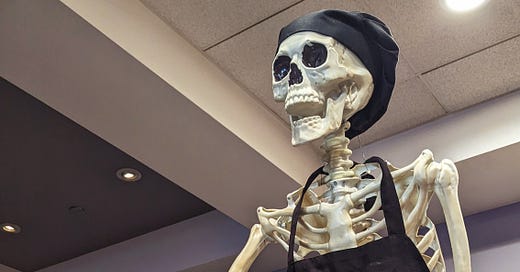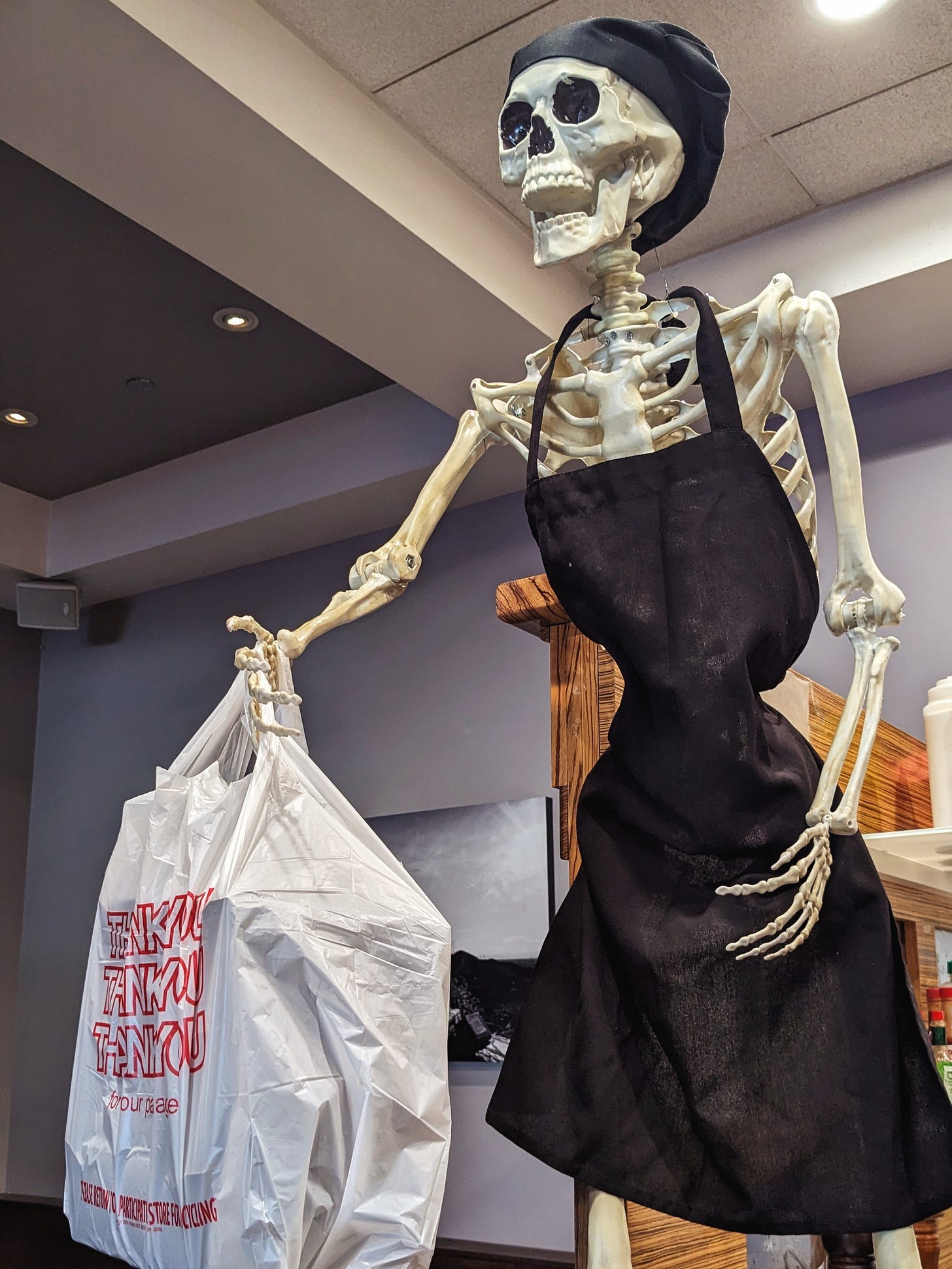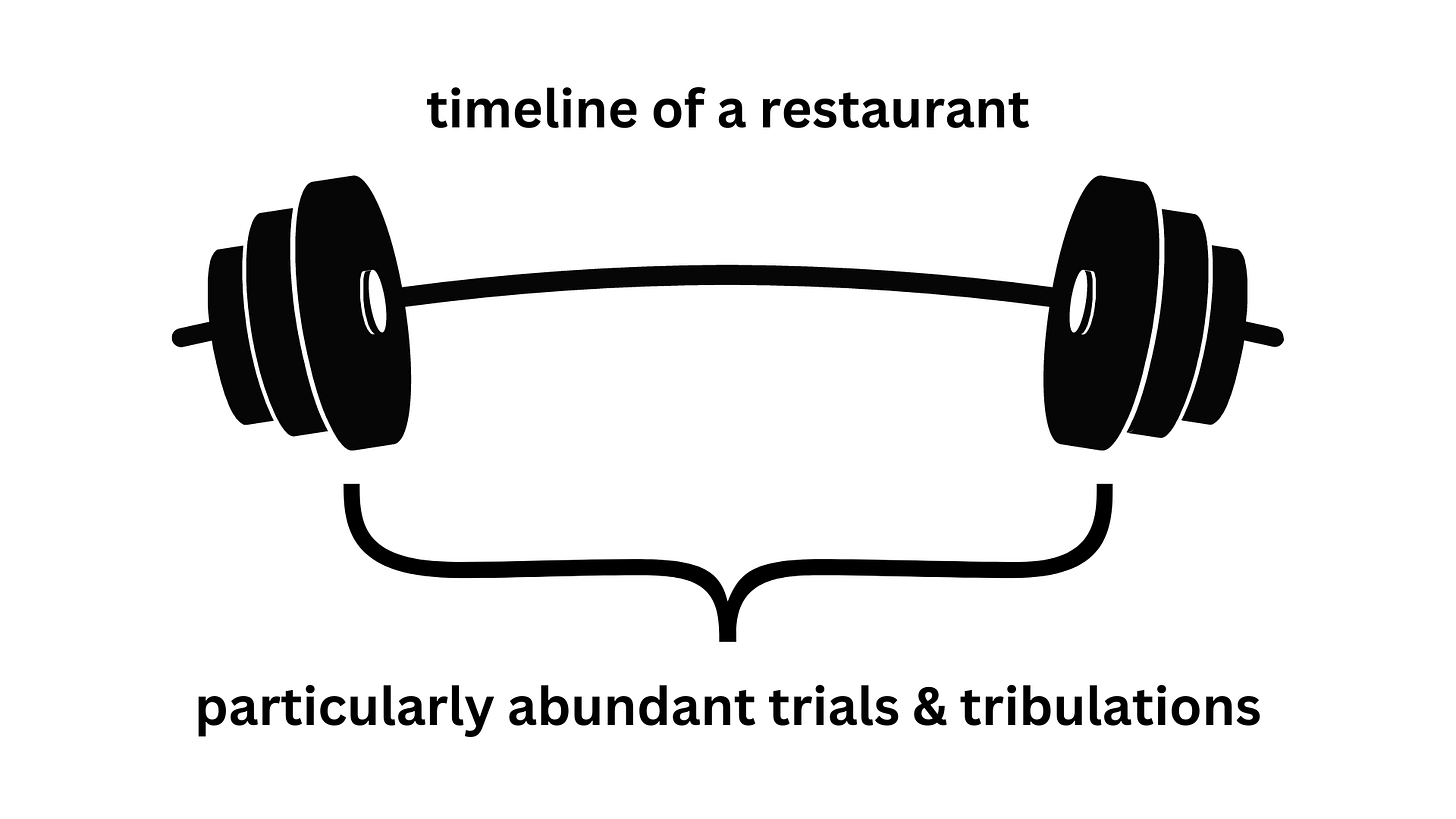A Few Trials & Tribulations of One Mere Restaurant
Two trials and one tribulation, to be exact.
Trial: a test of the performance, qualities, or suitability of someone or something.
Tribulation: a cause of great trouble or suffering.
Every restaurant that there is undergoes countless trials, encounters innumerable tribulations. They tend to especially bookend the timeline of a restaurant, resembling a barbell (see image). Opening a restaurant begins one-to-several years of constant situations, problems, and headaches; at least half of them totally unforeseen. The act of closing a restaurant can sometimes be a result of the buildup of trials and tribulations once again, now too much for the operator to conceive of coping with. That, or their landlord’s an asshole who tripled rent when the time came to renew the lease. Typical stuff.
But the fact that the barbell’s weights are at each end does not mean the bar itself is weightless. Ask any restaurant operator about their day, any day; they’ll deliver you a string of anecdotes so thoroughly exploring the many bizarre facets of the human personality you could publish them to acclaim in The Weekly Anthropologist. Or The New Yorker. Or tell a friend in development who’ll be only too happy to give you a hundred bucks and run off to the studio with his pitch for “The Bear…but funny!”
As the title states, these are three of the regular, bar-weight trials and tribulations of one mere restaurant. Reader discretion is advised.
Trial: The Rush State
Customers come and go like the tides: predictable, to a degree. For dinner, 5:00 is too early and 8:00 too late, the tide is out or going out. At 6:00 the tide comes in, and by 6:30 it is in. That’s all more or less inevitable, except for when we have the occasional freak early-or-late party, or it’s a Daylight Savings time of year and everyone’s personal clock is out of whack and we’re lambasted with a rogue 8:30 wave of diners who seem just as confused as we are. Mostly, you just hope that the tide doesn’t rise so much that it overwhelms the levees. Frequently a close thing on the weekends.
Unless something does go catastrophically wrong, and often even when it does, at 6:30 the entire staff of the restaurant enters The Rush State; the flow state triggered by an influx of customers so great that the only way to keep up is by just keeping up. For the common diner, ideally, it shouldn’t be noticeable. Hosts keep smiling, servers keep joking, bussers keep bussin’, the expo keeps barking, the bartender keeps slinging, the kitchen keeps clanging. What goes away is breathing. The down time between tables and tasks vanishes in an instant.
Party at the front, four-top checking in, table not ready; phone call, to-go order, enter and fire, ready in 30 minutes; walk-in, nope, phone call, just a second please, thank you, you have a reservation for five at 7pm, yes I see that, oh, now it’s for seven, um…let me put you on hold for just a moment, thank you, hi, party of two? just walking in? great, let me get you seated, right over here, there you go; okay, water on 14, and a Diet Coke, with lemon, can do; shoot, bus tub’s looking full, I should- shit, forgot the phone’s on hold, uh…hello? sorry about that, had to…check with the, uh, host (they’ll never know I’m the host), yes we can confirm your party of seven at 7pm (no idea where I’m going to put them, we’ll figure it out) okay? okay great, see you then, bye; what was I — bus tub, right, BEHIND! why do they always dump all the wet stuff on top of everything else, ketchup all over my fingers, ugh, and that’s just an untouched salad, wonder what was wrong with it BEHIND! crap, party at the front, I’ll just drop this off CORNER! can I just leave this? thank you thank you CORNER! can’t run that, got people up front, sorry, I’ll come right back, oh, table 26 is up, perfect, let’s turn that over after we take care of these folks- and the line’s out the door, how’d that happen? pull it together; Hey folks, how’s it going tonight?
And so on.
Service becomes a breathless, contiguous string of actions, events, and requests to fulfill, and by the time you reach the end of the string, it’s 8:30, and the past two hours are at best a blur, at worst simply gone. The rush state is like a high in more ways than one; not just what it does to your memory, but the vivid beating pulse of it. There are bad rushes and good; in the bad, you feel the thread slipping, the priorities overwhelming, you feel wired and a little jittery and increasingly drowned, struggling to keep not your head but only your lips above water. When it’s good, there’s never been anyone better at your job, and you’re part of a professional, competent, whirring-smooth machine, a production line that turns tired, huddled masses back into satisfied, smiling humans through pure hospitality, hot food, and stiff drink, so functional it’s practically automatic, featuring yours truly as indispensable cog.
The rush state is the weekly restaurant stress test. Fragile or broken elements will be obviously exposed — a server that misfires orders backs up the kitchen with on-the-flys which jam up the entire line; a poorly organized POS causes a traffic jam at the server station; a perfectionist pantry cook freezes multiple tables’ worth of items in the window while they delicately place pepperoni; the chatty bartender at the far end of the bar doesn’t notice that the ticket printer hasn’t stopped for minutes, its long white tail now dangling to the floor and a server riot beginning to boil; the panicky host quadruple seats two servers simultaneously, overwhelming both them and, in ten minutes, the already-precarious kitchen when all eight tables fire entrees all at once.
In the rush state, the restaurant team reveals their average service quality, the kind of experience they provide with all cylinders firing and the brake lines cut, running solely on tried and tested instinct. There are certainly freak rushes both ways: some nights are downright incredible, the house is warm and smiling and uproarious; and others are unavoidably, cosmically fucked from the start, as though God has chosen your specific little dollhouse to personally toy with that night, a domino trail of catastrophe. But typically, if your team is good on average, the rush state will yield good service, no more, no less. Bad on average yields bad service. Excellent, excellent. And so often, mediocre, mediocre.
The rush state mostly repeats weekly through the year, and twice or more every week between Thanksgiving and New Year’s.
Tribulation: The Perpetually Unhappy Regular
There are many brands of hypocritical customer — as many as there are hypocritical people — but only a few paradoxical customers. Hypocrisy and paradox are close but distinct human qualities; one difference can be found in the common response to each, which is annoyance and frustration towards hypocrisy, and utter bewilderment, bafflement, and occasionally an intrigued sociological curiosity at paradoxical behavior. Ultimately, to be hypocritical is to be human, to proffer personal exceptions to personal rules. To be paradoxical is to evolve into something more, to hold two truths to be self-evident, complementary, and inclusive, where to the natural logic neither truth can exist in the presence of the other.
What the hell does that mean? Let’s dig in.
Consider the Regular: you know, a frequent, almost cadenced customer of a restaurant. They return to the establishment either often in general, or often on a, say, “regular” basis: weekly for Sunday dinners, Friday lunches, or late night Tuesday ice creams. A Regular will probably have a preferred seat or table, drink, and order, even a favorite server. I think it stands to reason — practically a base reason, an instinctual, essentially human reason — that Regulars like the place to which they are regular. Right? They like it, and that’s why they come back, even working it into their weekly routine. No matter what other qualities the regular possesses — they can be friendly, or lonely, or heavy on the drink, or creepy, extroverted or introverted, persnickety, a gregarious unofficial host or a borderline chatterbox barfly — they like the restaurant well enough to return to it again and again. As homo sapien, when we like something, we want more of it, yes? You might call that an infallible law of humanity, and you’d be right (unless you’re a contrarian; but even then, you like to be contrary, and so you continue being contrary).
And yet.
Introducing The Joneses (a made-up name for a real couple, already instantly recognizable to the coworkers of our restaurant, but to be especially clear are not named Jones). The Joneses bring their own wine. The Joneses always have at least one, if not multiple complaints about the menu. The Joneses frequently send their food back. The Joneses whine about the attire of other customers while Mrs. Jones removes her shoes to eat (not for the whole meal, only once the food arrives). The Joneses argue with their server over our cheeky, free dessert-awarding weekend food quiz, which rewards every customer who plays, correct answers or not, a free dessert.
The Joneses do not like our restaurant. The Joneses visit nearly every week.
I…
So…
To begin dissecting…
Um…
You know what, I don’t get it. I can’t get it. I toss around the word, “unfathomable,” a lot, because it’s a fun, dramatic word. But the depths of the logic of the Joneses and people like them (of which every restaurant, I believe, has at least one) can literally not be fathomed. In the roiling seas of their minds, the place where the tectonic plates of Like Something and Want More Of It overlap occurs in such a deep, black void that nature becomes twisted, and the great, crushing pressure cracks a fallacy into the infallible. Like somehow becomes Dislike, and yet still meets Want More Of It. It makes as much sense to them, is as essential and human a rationale, as the other is to the rest of us.
The Joneses are a classic tribulation. They seem to exist to cause our suffering on a regular basis. They are the Lord to our Job, ineffable in their purpose, which we can only grasp at interpreting as a test of how much patience a restaurant can muster for such callow creatures.
Trial: Managing the Inconceivable Spectrum of Customer Expectations
Note: The following are archetypal examples rather than actual customers. Any resemblance to a person, real or fictional, is totally a coincidence — or whatever the movies say.
Table 11 walked in five minutes ago, a young couple who just moved to the area out for a Friday night stroll to see what’s what in cozy Montrose. They snagged the last available table (for the next 30 minutes at least) and are alternating perusing the menu with glancing somewhat furtively around the place, soaking in the busy-ness, the noise, the cluster around Table 12 after Table 31 got up and saw their kids’ friend’s family and had to stop to say hi and don’t you think they have too much homework nowadays and hey, you’re in insurance, right? Table 11 came in with no expectations other than to discover for themselves why the restaurant was full and busy. They are the easiest, and our favorite, to please.
Table 23 primarily wants to be recognized for knowing the owner. They will request this recognition a number of ways: by saying, “I know the owner” and oh so subtly raising their eyebrows; by asking, “Is [owner’s name] here?” when told there’s a wait for tables; by casually mentioning, “Oh, [owner] told us to get that dish last time,” when placing their order. They will never miss a chance to let each unique staff member that visits their table know that, well, you know who they know. Other than that, they’re actually quite pleasant. A simple, surprised, “Oh!” is enough to meet their expectations. The owners couldn’t tell you Table 23’s names if you gave them 23 guesses. Or 23 more.
Table 16 is here for their regular Friday night family dinner. They demand a server with balance, mainly because of Dad. The man seems to revel in the wake of uncomfortable silence following some horrible attempt at a quip. For example, looking at his wife’s empty plate and saying, “Wish she would clean all the plates like that, you know what I mean?” It’s impossible to intuit a response to such a reckless, wanton string of words. Laugh, and the rest of the table of scaling grimaces think you’re at best an idiot, at worst a fellow casual misogynist. Don’t laugh, and risk irking the man responsible for the tip. Not to mention the tirade to follow about how “we can’t joke about things anymore” and “no one has a sense of humor these days” which certainly has nothing to do with insecurity or the simple fact that some people, one day, just lose the ability to be funny, ever again. The server laughs because they need the tip; and at least they know they’re not a misogynist. Table 16 expects a tightrope of service, if nothing extravagant from the food.
Table 18 is here at least once a week, if not multiple times between dining in and to-go. They are particular about their order. Nice enough if all goes well, as it usually does. But the meniscus between, “Having a pleasant dinner,” and “If my food doesn’t arrive in one minute I’m going to flip the table and then demand to see the manager, in that order,” is thin, indeed. There’s a type of person that interprets hospitality mistakes — rife in every restaurant, just disguised better in some — as a personal affront, a backhanded slap to their mislabeled sense of honor that would more realistically be described as a glass-fragile veneer of entitlement that leaves everyone bloody when shattered. I can’t believe this, This is unacceptable, What are you going to do about this, where “this” refers to cooking their Medium Rare steak to Medium or seating them at any table but the one they prefer. Not only have have they clearly never worked a service job, they went to the Cotillion school of prim command brooking no quarter, behavior further inspired by and sharpened to a jagged edge under a raging high school coach’s spittle-launching tongue. The peasants respond only to a stern lashing, justify the feudal overseers of their minds. But you know, as long as the food is correct, and on time, and all other expectations met exactly, then they are happy as particularly chummy clams. Table 17 expects perfection, that’s all!
Table 41, a slightly past middle-aged couple, wants to have a nice anniversary. We see them once a year, on their anniversary. We wish it were more often, because they are completely adorable in love (“41 is goals” says the host, and the rest of us agree), and so easily friendly with their server — but for some reason, it’s not. We wonder if there’s an expectation we’re missing, that might bring them back. But it doesn’t seem like it. They order, they chat, they enjoy a bottle of more expensive wine and laugh loudly, silhouetted against the street traffic in the front window. At some point or another, but usually towards the end of their meal, they hold hands across the table, which sends all of us aflutter anew. They get dessert. They tip well. Then, somewhere in the hustle, they slip away until next year. Table 41 expects a nice anniversary, and in a poignant example, they themselves fulfill that expectation as much as, if not more than, we ever could.







